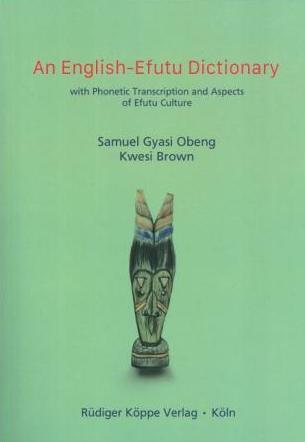
An English-Efutu Dictionary
with Phonetic Transcription and Aspects of Efutu Culture
Author: Samuel Gyasi Obeng, Kwesi Brown.
202210 pp. Roman, 115 pp.
Appendices: Selected Efutu Proverbs, Glossary of Aboakyir Cultural Event (The Aboakyir Deer (Buck) Hunting Festival), Selected Aboakyir (‘Deer-hunting’) Festival Songs, Efutu Folktales
Text language(s): English
Format: 160 x 220 mm
240 g
Paperback
€ 34.80
Buy 'An English-Efutu Dictionary' as a downloadable PDF document directly from our online shop »
Order 'An English-Efutu Dictionary' as print edition »
According to Efutu folklore and legend, the first Efutu people settled at Takyiman in Ghana’s Bono East Region and moved to the coast where they came into contact with the Fante (Akan). The Efutu later moved to Mumford and Afutu near Cape Coast, where they founded the Fetu Empire. In 1515, under the leadership of Osimpa, the Efutu migrated to present day Simpa (Winneba) on the coast.
Ethnographically, the Efutu are closely related to the Senya and Awutu ethnic groups. Indeed, the Efutu, Awutu and Senya languages and cultures are so related to each other that they are often spoken of as one and the same ethnic group – Efutu-Awutu-Senya.
With regard to religion, the Efutu are predominantly animists who worship God through their gods (deities), spirits of their ancestors and the souls of their religious leaders. Two relatively newer forms of religion, Christianity and Islam, are also practiced by some Efutu but it is important to note that most Efutu practice two or more of the above religions concurrently. An important religious ritual is the festival called Aboakyir (literally meaning Animal-catching) which is celebrated on the first Saturday of May every year. This festival is celebrated in remembrance of their migration from the ancient Western Sudan Empire.
On warfare and militarism, the Efutu have two military battalions, Tuafo and Dentsirfo, with each battalion having its own chiefdom. The Efutu are polygynous, but unlike the main Akan ethnic group in Ghana, the Efutu society is patriarchal, and inheritance is done mainly through patrilineage. However, given modernity and Ghana’s western-based jurisprudence, property may be passed on to a surviving spouse and their children. A distinguishing cultural practice the Efutu share with other West African ethnic groups is that of anthroponymy – personal names. An individual is given a day-name based on the day of the week on which s/he is born.
The Efutu-Awutu-Senya languages belong to the Niger-Congo phylum and are part of the Kwa language family. They are spoken in Winneba (a historic fishing port in south Ghana, lying on the south coast, 140 km east of Cape Coast), Awutu, and Senya Beraku (also called Bireku) as well as in villages and townships in and around Obutu (also called Awutu Beraku) and Bawjiase. There is however mutual intelligibility between the various dialects. Also, even though Awutu is more geographically widespread than Efutu and Senya, the term Efutu is used to refer to the group of languages in general because the city of Winneba, where Efutu is spoken, is politically more important because they have the paramountcy chiefdom. Winneba, where Efutu is spoken, is also educationally more prominent given that it has a university with three big campuses in the same town and six other campuses spread across Ghana. It also has many K-12 schools.
Under these links you will find publications by the authors and descriptions of further Ghanaian (Kwa) languages and cultures:
Accompanying material:
- A Dagaare-Cantonese-English Lexicon for Lexicographical Field Research Training
(ISBN 978-3-89645-009-8 ) - A Linguistic Study of Ewe Animal Names among the Ewe of Ghana
(ISBN 978-3-89645-474-4 ) - Basic Ewe for Foreign Students
(ISBN 978-3-89645-584-0 ) - Die Konstruktion von Ethnizität
(ISBN 978-3-89645-207-8 ) - Kurzgrammatik des Ewe
(ISBN 978-3-927620-19-3 ) - Studies in Ghanaian Languages and Linguistics
(ISBN 978-3-89645-366-2 ) - The Grammar of Verbs and their Arguments
(ISBN 978-3-89645-769-1 ) - The Problem of Violence
(ISBN 978-3-89645-891-9 )
Cross-reference:
- “Once a child leaves the womb, the community has to become the womb.”
(ISBN 978-3-89645-852-0 ) - African Linguistics in the 21st Century
(ISBN 978-3-89645-765-3 ) - African Sociolinguistic and Sociocultural Studies
(ISBN 978-3-89645-721-9 ) - Beside the State
(ISBN 978-3-89645-254-2 ) - Conversational Strategies in Akan
(ISBN 978-3-89645-262-7 ) - Ethnizität und Markt
(ISBN 978-3-89645-248-1 ) - Hexenjagd und Aufklärung in Ghana
(ISBN 978-3-89645-909-1 ) - Mining Frontiers
(ISBN 978-3-89645-832-2 ) - Spaces in Movement
(ISBN 978-3-89645-905-3 ) - Topics in West African Discourse-Pragmatics
(ISBN 978-3-89645-856-8 ) - Verwandtschaft und Mittelklasse in Ghana
(ISBN 978-3-89645-844-5 ) - Wege durch Accra
(ISBN 978-3-89645-887-2 ) - Zugehörigkeiten
(ISBN 978-3-89645-843-8 )
| « back | Print version | [top] |
 Books
Books Audio
Audio Biographies
Biographies Series
Series Festschrifts
Festschrifts Journals
Journals